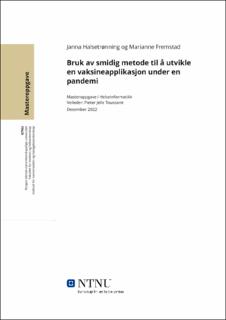| dc.contributor.advisor | Touissant, Pieter Jelle | |
| dc.contributor.author | Halsetrønning, Janna | |
| dc.contributor.author | Fremstad, Marianne | |
| dc.date.accessioned | 2023-03-28T17:19:12Z | |
| dc.date.available | 2023-03-28T17:19:12Z | |
| dc.date.issued | 2022 | |
| dc.identifier | no.ntnu:inspera:122095699:58322845 | |
| dc.identifier.uri | https://hdl.handle.net/11250/3060791 | |
| dc.description.abstract | I 2020 ble verden som kjent rammet av Covid-19-pandemien. Verdens helseorganisasjon erklærte krisetilstand i januar 2020, og smittetrykket førte til at regjeringen innførte de strengeste tiltakene landet noen gang har hatt i fredstid. Etter hvert ble det utviklet vaksine og dertil presserende behov for et IT-system som kunne understøtte arbeidsprosessene knyttet til vaksinering av innbyggerne i kommunen. Studien omhandler erfaringer og opplevelser knyttet til utviklingsprosessen av en vaksineapplikasjon ved bruk av smidig metode, med utgangspunkt i et bruker- og utviklerperspektiv.
Denne masteroppgaven er en kvalitativ studie som baserer seg på semistrukturert intervju med åtte personer som deltok i utviklingsprosessen av vaksineapplikasjonen. Utvalget bestod av fire helsepersonell og fire utviklere fra IT-tjenesten, og den kvalitative undersøkelsen ble gjort separat for de to informantgruppene. Som metodisk fremgangsmåte ble det valgt en stegvis-deduktiv induktiv metode, intervjuene ble transkribert og kodet ved hjelp av NVivo.
Forankring fra ledelsen, økt mobilisering og et felles mål om å utvikle “Norges beste vaksineapplikasjon” er faktorer som i stor grad har hatt en positiv innvirkning på utviklerteamets opplevelse knyttet til utviklingsprosessen. De stadig skiftende føringene fra Folkehelseinstituttet beskrives som den største utfordringen blant teammedlemmene. Dette skapte et stort arbeidspress og medførte at arbeidsmetoden måtte tilpasses omgivelsene.
Helseinformantene hadde varierende erfaringer med denne måten å jobbe på, hvorav to av informantene satt igjen med gjennomgående positive erfaringer. De to øvrige helseinformantene hadde imidlertid mer blandede opplevelser. Denne variasjonen ser vi i sammenheng med ulik grad av involvering og helsepersonell sin kunnskap om smidig metode og programvareutvikling som sådan.
Utviklerteamet og helsepersonellet jobbet tett og intensivt over mange måneder, og samarbeidet var preget av høy motivasjon og en gjensidig avhengighet for å lykkes med utviklingen av vaksineapplikasjonen. | |
| dc.description.abstract | In 2020, as is well known, the world was hit by the Covid-19 pandemic. The World Health Organization declared a state of emergency in January 2020, and the pressure of infection led the Norwegian government to introduce the strictest containment measures that the country has ever had in peacetime. Eventually, a vaccine was developed and there was an urgent need for an IT-system that could support the work processes related to vaccinating the residents of the municipality. The aim of this study was to describe healthcare workers and developers experiences related to the development process of a vaccine application using an agile method.
This master's thesis is a qualitative study based on semi-structured interviews with eight people who participated in the development process of the vaccine application. The committee consisted of four healthcare personnel and four developers from the IT-service. The qualitative survey was carried out separately for the two groups of informants, and a step-by-step deductive inductive method was chosen as a methodological approach. The interviews were transcribed and coded using NVivo.
Anchoring from the management, increased mobilization, and a common goal to develop "Norway's best vaccine application", are three factors that had a largely positive impact on the development team's experience related to the development process. The constantly changing guidelines from the Norwegian Institute of Public Health were experienced as the biggest challenge among the team members. This created enormous work pressure and meant that the working method had to be adapted to the surroundings.
The health informants had varying experiences with this way of working, of which two of the informants left with consistently positive experiences. The other two health informants, however, had more mixed experiences. The health informants had experiences that were notably affected by the varying degrees of involvement of the informant, the healthcare personnel's knowledge of agile methods and software development.
The development team and the healthcare personnel worked close and intensively together over many months, and the collaboration was characterized by high motivation and a mutual dependence to succeed with the developement of the vaccination application. | |
| dc.language | nob | |
| dc.publisher | NTNU | |
| dc.title | Bruk av smidig metode til å utvikle en vaksineapplikasjon under en pandemi | |
| dc.type | Master thesis | |
